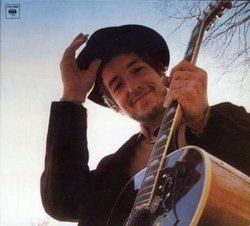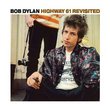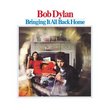| All Artists: Bob Dylan Title: Nashville Skyline (Hybr) Members Wishing: 3 Total Copies: 0 Label: Sony Original Release Date: 1/1/1969 Re-Release Date: 9/16/2003 Album Type: Hybrid SACD - DSD, Original recording reissued, Original recording remastered Genres: Country, Folk, Pop, Rock, Classic Rock Styles: Contemporary Folk, Singer-Songwriters, Folk Rock, Country Rock, Album-Oriented Rock (AOR) Number of Discs: 1 SwapaCD Credits: 1 UPC: 827969031964 |
Search - Bob Dylan :: Nashville Skyline (Hybr)
 | Bob Dylan Nashville Skyline (Hybr) Genres: Country, Folk, Pop, Rock, Classic Rock
|
Larger Image |
CD DetailsSimilar CDs
|
CD ReviewsGood album - can't believe the poor remastering C. J. Zimmel | United States | 10/19/2006 (1 out of 5 stars) "Man, I always thought the guys who complained about the CD remastering of Dylan's albums were full of themselves. However, I was quite surprised that nobody sees the problems with this remastering. I borrowed the remastered "Nashville Skyline" CD from a friend a few years ago when he found out I had never heard the album before. I listened to it a few times and promptly returned it, stating that it was really disappointing. It sounded like a short, poorly-recorded album of Dylan with a weird voice. When I tracked down a good turntable, I picked up a bunch of Dylan vinyl to see how other albums fared in comparison to the CDs. I finally got around to "Nashville Skyline" last month, and discovered that the album was pretty good. The sound quality was much better than I remembered, even though my vinyl copy is pretty scratchy. Then, I ordered the remastered CD last week, thinking that I didn't give it a good chance the first time............... Oh boy! What a tragedy. The remastered CD is truly as awful as I remember. I could not believe that the CD could have been worse, so I did a track by track analysis. Turns out the entire CD suffers from problems not found on the vinyl. The CD has noticeable tape hiss, with attenuation of the higher frequencies, and a complete lack of punch. The real travesty is that some tracks sound like they have been remixed, as some instruments have been relocated and brought up or down in level. A real travesty considering the vinyl mix is pretty good. The remastering problems really "cheapen" the album overall. If you have this album on vinyl, just listen to the first few acoustic guitar chords and how they have a "bite" to them on the record that is gone on the CD. It only gets worse from there. This is the only remastered Dylan CD I have been disappointed with. I regret buying the CD and will wind up making a CD copy of my record." Very good album, just not my favorite Dylan material Manny Hernandez | Bay Area, CA | 08/14/2006 (4 out of 5 stars) "Having enjoyed Bob Dylan's first nine albums (recorded in the span of little less than six years) and his evolutions as an artist in the same timespan, I grew up to love Dylan's folk/rock style and upfront lyrics. So it's no surprise that "Nashville Skyline" struck me as a bit of a step back for him, though it involved a firm step into country territory and away from what had become his signature sound up to that point. Maybe it was the combination of his voice sounding so different, the songs not being as "outspoken" and the fact that I just don't enjoy Dylan doing country as much as I love him as a folk rock singer, but the result is that I didn't enjoy "Nashville Skyline" as much as his earlier material. Having said that, though, it may strike you that I am stil giving the album four stars. I wouldn't penalize it with less, because in spite of my personal preferences in terms of Dylan, it's still a solid album with production values that have withstood the test of time." Bob going country with great results, but unfortunately the Mike London | Oxford, UK | 10/10/2007 (5 out of 5 stars) "When NASVHILLE SKYLINE came out in 1969, it was a shocking album to a large portion of Dylan's fan base. Never one to be backed into labels and corners, Dylan largely turned his back on the growing political and cultural turmoils of the day, and instead made a simple country album. Another surprising element, not expected at all the public, was how different Dylan's actual voice sounds from the rest of his 1960s output. He is singing in a soft, country croon, in a voice as smooth as good whiskey, and a total departure from his earlier, more nasal singing style. The album was popular and sold well, but Dylan was taken to task over the slight nature of some of the material.
This is the first album in what is known as Dylan's domestic period, which lasted from 1969 to 1975. The subject matter and musical direction Dylan primarily explored during this era was one of domestic and family matters, which makes sense as that was his primary priorities at the time. Ultimately, this period would culminate in the 1975 masterpiece, BLOOD ON THE TRACKS. The songs themselves are simple and direct. Eschewing the complex poetics of his electric trilogy and the socially aware lyrics of his earlier protest music, Dylan instead wrote simple love songs and lyrics much more in line with the country music of the day. The album itself is very brief, only a mere twenty seven minutes long. This album offers several strong compositions, including the major hits "Lay, Lady, Lay," "Tell Me It Isn't True," and "Tonight I'll Be Staying here with You." "Lay, Lady, Lay" was originally written in 1968 (one of the few Dylan songs written during that year) for inclusion in the rated X film "Midnight Cowboy", but was not completed in time. Several of the songs are brief and rather slight, including an instrumental "Nashville Skyline Rag" (Dylan's first instrumental), "Peggy Day", and "Country Pie", the last song only being a mere 1:35 long. Due to these rather slight songs, NASHVILLE SKYLINE appeared to indicate that Dylan was having trouble coming up with original material, due to the brevity of the album (it is still Dylan's shortest studio album to date), and that the opening cut, a duet with Johnny Cash, is a song recycled from the 1963 album, FREEWHEELIN' BOB DYLAN. Of the three hit singles, "Lay, Lady, Lay" proved to be his most well known. "Lay, Lady, Lay" was Dylan's last top twenty single of his career. Though this is all descriptive of the album itself, it does not fully explain the history and context of the album. Too better appreciate and understand people's reaction and Dylan's motivation, and to get a more complete perspective on this period of Dylan's career, you should know some additional facts. In the late 1960s, America was going through revolutionary times, both culturally and socially. Music, drugs, and wild lifestyles were brushing up against more conservative types. Racial riots occurred in several major cities. Martin Luther King and Robert Kennedy were both assassinated within months of each other. President Nixon began his administration. Viet Nam was still an extremely hot political topic. The United States was very divided. Rock music played a large part in this 1960s cultural changes, and Bob Dylan was a large part of those changes. Lots of people, both the press and the youth culture, looked at Bob Dylan as a "spokesman of a generation," a statement that Dylan firmly rejected. While Dylan by this time had been fairly inactive since 1966, he was still highly regarded as one of the major cultural figures of the 1960s youth culture. By 1969, the year NASHVILLE SKYLINE came out, Dylan had relocated to Woodstock, New York, trying to live with his family. He had three children, and fatherhood had changed his priorities. He largely been missing in action during most of the late 1960s. He had not toured since 1966. After his motorcycle crash, his musical direction radically changed directions, going from the wild, eclectic surrealism of his electric trilogy to the muted, rustic feel of the late 1967 album, JOHN WESLEY HARDING. Listening to JWH as a followup to BLONDE ON BLONDE, there is a huge disconnect. The missing link, naturally, is the Basement Tapes, which would not be released at all in the 1960s. While JWH was as different from his electric output as his electric output was different from his acoustic and protest output, the album was a roots-rock music. JWH, just like The Band's BIG PINK album and The Byrds' SWEETHEARTS OF THE RODEO, was definitely in the rock genre but closely tied to country music. It was a hybrid. It was closer to rock than to straight country. JWH sold well, and is now regarded as a seminal 1960s album that helped influence rock. JWH helped birth the whole country-rock that would become, along with psychedelic music, one of the major rock genres of the late 1960s. However, the public still did not have the Dylan they wanted, a leading figurehead for the counterculture. Dylan was feeling pressured to live up to this role, and his family lost much of their privacy. When Dylan decided to record a followup to JWH, he decided to pull up the whole notion of his being a spokesman for the generation by "its roots". Returning to Nashville, where BLONDE ON BLONDE was recorded three years previous, Dylan decided to record a straight country album, with steel guitars, brief, simple songs which were all lyrically straight-forward and in some cases rather slight. While JWH flirted with modern country but was still primarily rooted in traditional folk music but played in a rock and roll context, NASHVILLE SKYLINE is a pure country album, through and through. Not only that, Dylan teamed up with Johnny Cash on one number! (Johnny Cash and Dylan recorded a large number of songs during the NS sessions. These recordings are widely available via bootleg, and are of more interest to Cash fans than Dylan fans, as Cash dominates the recordings). While JWH still helped maintain Dylan's position as a counter cultural hero, NASHVILLE SKYLINE is a deliberate attempt to shed off the idea he was a spokesman for a generation. As Clinton Heylien noted, "if Dylan was concerned about retaining a hold on the rock constituency, making albums with Johnny Cash in Nashville was tantamount to abdication in many eyes." Due to the described circumstances above, NASHVILLE SKYLINE also marks the first time the critical establishment was rather wary at supporting their favorite nasal-singing troubadour. Though the album was overall positively received, there were diffinite seeds of dischord among various factions of the rock community and the music critics. In a very short time, this critical discontent would explode into a full scale assault with the release of SELF PORTRAIT, although a few (just a few) could have gotten onto this release and sounded right at home Overall, NASHVILLE SKYLINE is a brief, enjoyable album, and Dylan's only pure country release. Though some of the songs are slight and there's not a lot of material, the album has a nice, direct sound not often heard on a Dylan album. Though his other records from the 1960s are more esteemed, NASHVILLE SKYLINE stands as a proud last addition to his sixties songbook as that era drew to a close, both culturally and in Dylan's own career. " |

 Track Listings (10) - Disc #1
Track Listings (10) - Disc #1

